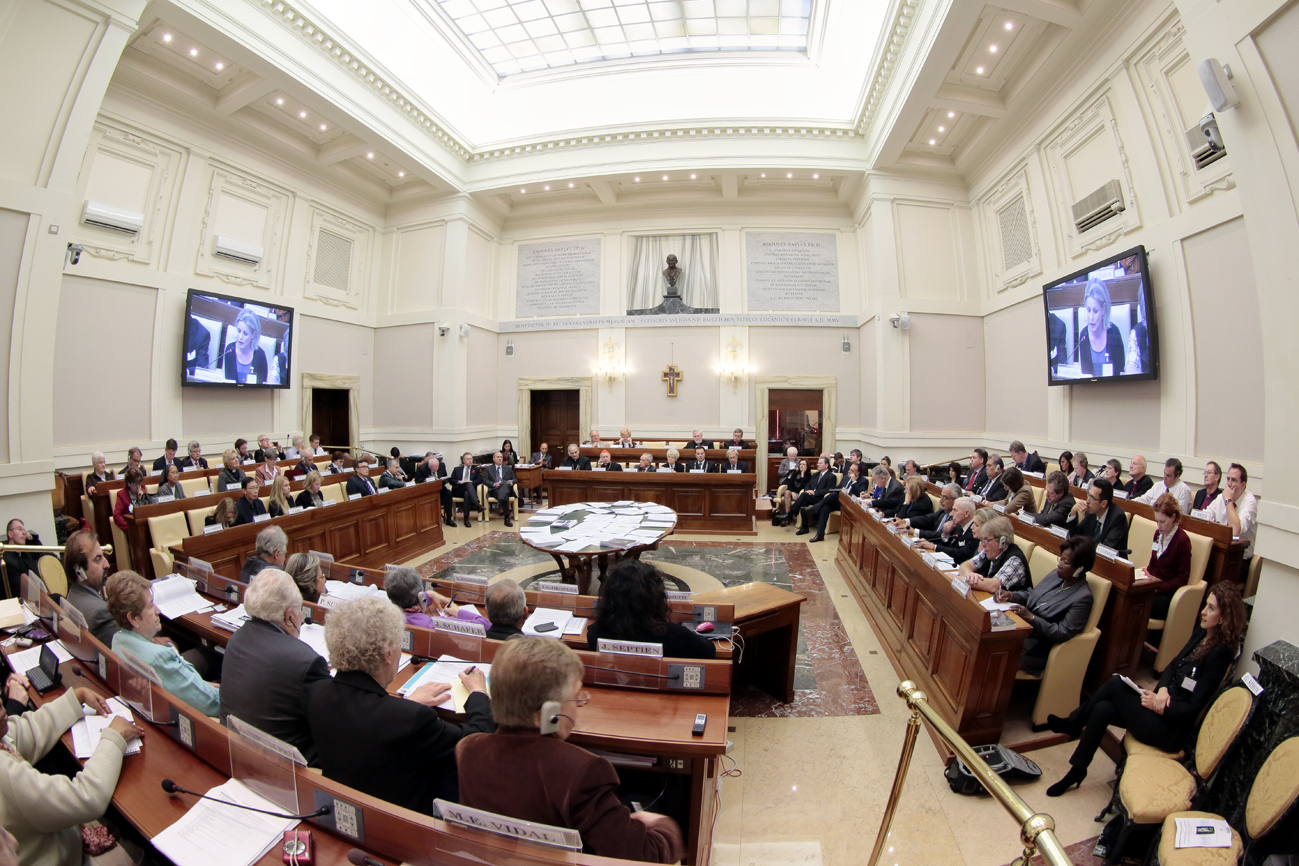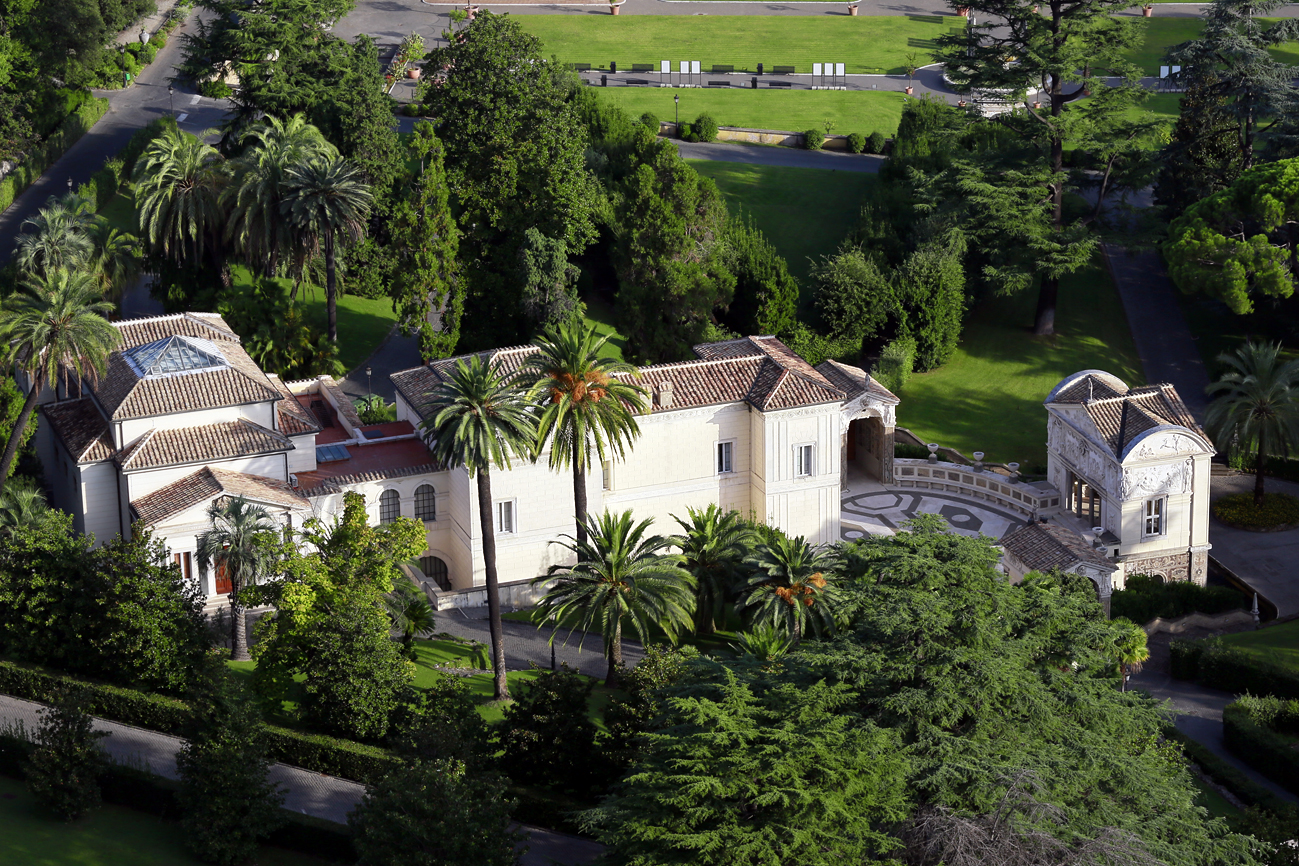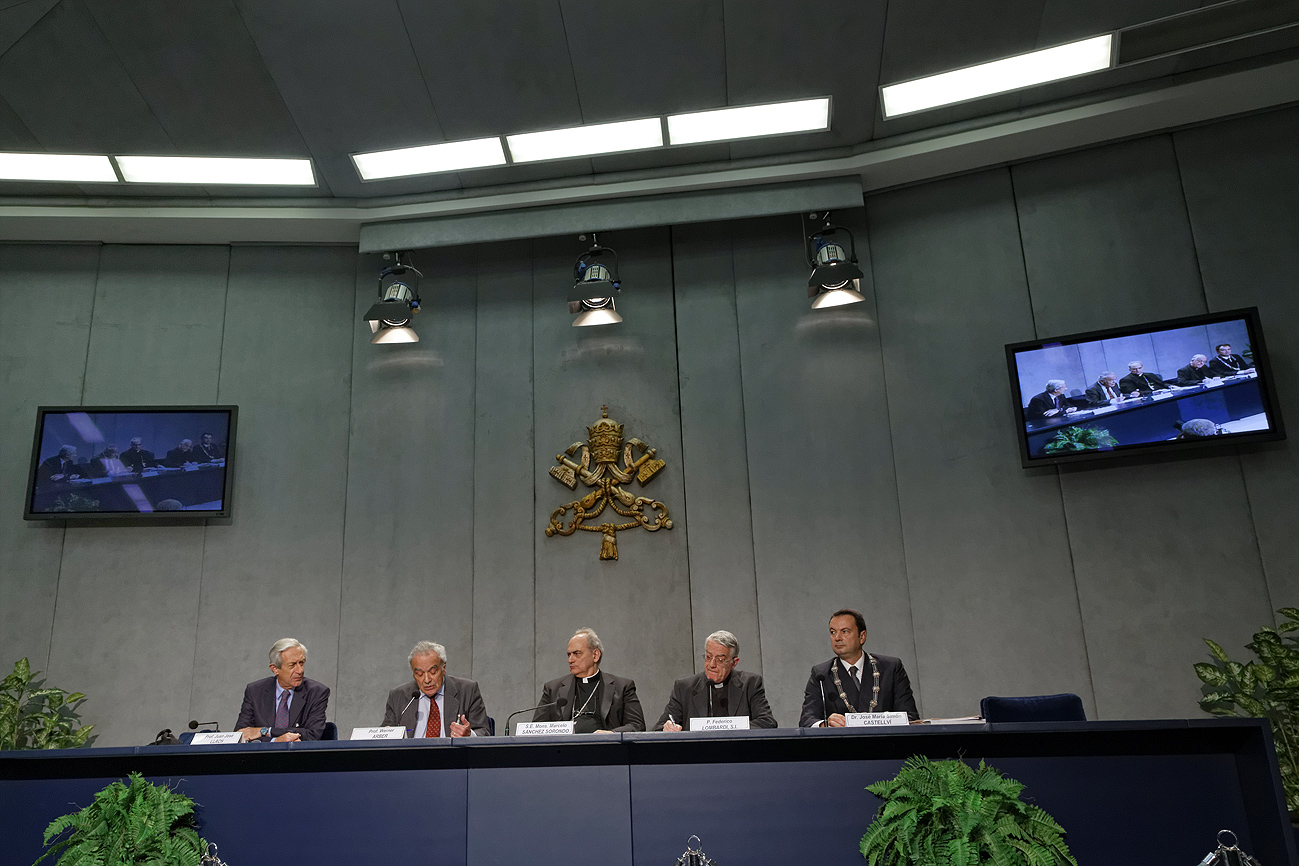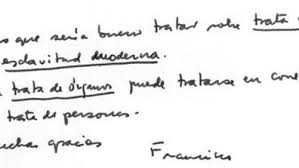The Chancellor of the Pontifical Academies of Sciences and of the Social Sciences, Marcelo Sánchez Sorondo, released the following message ahead of the workshop:
Following a wish expressed by Pope Francis, the Pontifical Academies of Sciences and of the Social Sciences, together with FIAMC (World Federation of the Catholic Medical Associations) are organizing a preparatory workshop on 2-3 November 2013 in the Casina Pio IV to examine human trafficking and modern slavery, in order to establish the real status quo and an agenda to combat this heinous crime. For example, natural sciences today can provide new tools that can be used against this new form of slavery, such as a digital registry to compare the DNA of unidentified missing children (including cases of illegal adoption) with that of their family members who have reported their disappearance.
No one can deny that “the trade in human persons constitutes a shocking offence against human dignity and a grave violation of fundamental human rights” and is an accelerator of criminal wealth creation in this new century. The Second Vatican Council already stated that “slavery, prostitution, the selling of women and children, and disgraceful working conditions where people are treated as instruments of gain rather than free and responsible persons” are “infamies” which “poison human society, debase their perpetrators” and constitute “a supreme dishonour to the Creator”. In one of the few documents of the Magisterium of the Popes on this issue, quoted at the beginning of these lines, the Blessed John Paul II added that “such situations are an affront to fundamental values which are shared by all cultures and peoples, values rooted in the very nature of the human person”. Moreover, he affirmed that the topic is a central one for the social sciences and natural sciences, in the context of globalization. “The alarming increase in the trade in human beings is one of the pressing political, social and economic problems associated with the process of globalization; it presents a serious threat to the security of individual nations and a question of international justice which cannot be deferred”.
According to the recent UNODC 2012 Report on Trafficking, the UN started being aware of this increasing crime only in the year 2000, together with the emerging effects of globalization and subsequently drafted a Protocol to Prevent, Suppress and Punish Trafficking in Persons, Especially Women and Children, supplementing the United Nations Convention against Transnational Organized Crime, which has been signed by 117 parties. According to the 2012Report, between 2002 and 2010 the International Labour Organization estimated “that 20.9 million people were victims of forced labour globally. This estimate also includes victims of human trafficking for labour and sexual exploitation” (p. 1). Each year, it is estimated that about 2 million people are victims of sexual trafficking, 60% of which are girls. Human organ trafficking reaches almost 1% of that figure, thus affecting around 20,000 people who are forced or deceived into giving up an organ (liver, kidney, pancreas, cornea, lung, even the heart), not without the complicity of doctors, nurses and other medical staff, who have pledged to follow Hippocrates’ oath Primum non nocere instead. But these chilling figures “represent only the tip of the iceberg, as criminals generally go to great lengths to prevent the detection of their activities” (p. 16). Some observers speculate that, within ten years, human trafficking will surpass drugs and weapons trafficking to become the most profitable criminal activity in the world. Recent trends, however, indicate that human trafficking is already in the first place, so that far from being a declining social crime, it is becoming ever more threatening. International sex trafficking is not limited to poor and undeveloped areas of the world – it is a problem in virtually every region of the globe. Countries with large (often legal) sex industries create the demand for trafficked women and girls, while countries where traffickers can easily recruit provide the supply. Generally, economically depressed countries provide the easiest recruitment for traffickers. The regions that produce the most sex trafficking victims are the former Soviet republics, Asia, and Latin America.
Because of the human and moral scandal they mean and interests involved, which lead to pessimism and resignation, many international institutions have turned their backs. This is why it is so important for the Pontifical Academies of Science and of the Social Sciences, together with the Federation of Catholic Medical Associations, to follow the Pope’s wish directly, sine glossa. Today, against these new forms of slavery, we need to readopt the same attitude as the Catalan Jesuit St Peter Claver, who saw African slaves in Latin America as fellow Christians and, when he was solemnly professed in 1622, signed his final profession document in Latin as: Petrus Claver, aethiopum semper servus (Peter Claver, servant of the Africans forever). In short, this great Saint embodies the great Christian revolution, unknown to the Greeks and the Romans and to all of the previous civilizations, which began explicitly with the famous letter of St Paul to Philemon. Indeed, St Paul urges Philemon to consider Onesimus “no longer as a slave, but something much better than a slave, a dear brother”. In other words, as stated in the Second Vatican Council, in our times “everyone must consider his every neighbour without exception as another self, taking into account first of all His life and the means necessary to living it with dignity, so as not to imitate the rich man who had no concern for the poor man Lazarus”, by recalling the voice of the Lord, “As long as you did it for one of these the least of my brethren, you did it for me” (Mt. 25:40).
We must thus be grateful to Pope Francis for identifying one of the most important social tragedies of our times and having enough confidence in our Catholic institutions to instruct us to organize this workshop. As He said during the canonization of the Mexican St Guadalupe García Zavala, “this is called ‘touching the flesh of Christ’. The poor, the abandoned, the sick and the marginalized are the flesh of Christ. And Mother Lupita touched the flesh of Christ and taught us this behaviour: not to feel ashamed, not to fear, not to find ‘touching Christ’s flesh’ repugnant. Mother Lupita had realized what ‘touching Christ’s flesh’ actually means”. Pope Francis’ words are a clear response in the light of Jesus Christ’s message to this new form of contemporary slavery, which constitutes an abhorrent violation of the dignity and rights of human beings.
+ Marcelo Sánchez Sorondo
Seguendo un desiderio espresso da Papa Francesco, la Pontificia Accademia delle Scienze e la Pontificia Accademia delle Scienze Sociali, insieme alla FIAMC (Federazione Mondiale delle Associazioni Mediche Cattoliche) organizzano, presso la Casina Pio IV, il 2 e 3 novembre 2013, un gruppo di lavoro preparatorio per analizzare il traffico di esseri umani e la schiavitù moderna e stabilirne sia la reale situazione che un piano d’azione per combatterli.
Oggi – spiega mons. Marcelo Sánchez Sorondo, cancelliere della Pontificia Accademia delle Scienze – “le scienze naturali possono fornire nuovi strumenti da impiegare contro questa nuova forma di schiavitù, quali un registro digitale per confrontare il DNA dei bambini scomparsi non identificati (inclusi i casi di adozione illegale) con quello dei loro familiari che ne hanno denunciato la scomparsa”. Nessuno – prosegue – può negare che “la tratta di esseri umani costituisce un terribile reato contro la dignità umana e una grave violazione dei diritti umani fondamentali” e che, in questo nuovo secolo, funge da acceleratore della creazione di patrimoni criminali. Il Concilio Vaticano II affermava già che “la schiavitù, la prostituzione, il mercato delle donne e dei giovani, o ancora le ignominiose condizioni di lavoro, con le quali i lavoratori sono trattati come semplici strumenti di guadagno, e non come persone libere e responsabili” sono “vergognose”, “guastano la civiltà umana, disonorano coloro che così si comportano” e “ledono grandemente l’onore del Creatore”. In uno dei pochi documenti del Magistero dei Papi su questo tema, citato in apertura, il Beato Giovanni Paolo II ha aggiunto che “queste situazioni sono un affronto ai valori fondamentali condivisi da tutte le culture e da tutti i popoli, valori radicati nella natura stessa della persona umana”, affermando inoltre che l’argomento è di importanza centrale per le scienze sociali e le scienze naturali nel contesto della globalizzazione. “L’aumento allarmante del commercio di esseri umani è uno dei pressanti problemi economici, sociali e politici associati al processo di globalizzazione. È una grave minaccia per la sicurezza delle singole nazioni e un’improcrastinabile questione di giustizia internazionale”.
Secondo il recente Rapporto dell’UNODC 2012 sul Traffico di Esseri Umani – afferma mons. Sorondo – l’ONU ha iniziato ad essere consapevole di questo crimine crescente solo nel 2000, insieme con gli effetti emergenti della globalizzazione e ha, successivamente, preparato un Protocollo sulla Prevenzione, Soppressione e Persecuzione del Traffico di Esseri Umani, in particolar modo donne e bambini, adottato congiuntamente alla Convenzione contro la criminalità organizzata transnazionale, firmato da 117 parti. Secondo il Rapporto 2012, tra il 2002 e il 2010 l’Organizzazione Internazionale del Lavoro stima “che, globalmente, sono 20,9 milioni le vittime del lavoro forzato. Questa stima include anche le vittime della tratta di persone a scopo di manodopera e sfruttamento sessuale”. Ogni anno, secondo le stime, circa 2 milioni di persone sono vittime del traffico sessuale, il 60% delle quali sono ragazze. Il traffico di organi umani raggiunge quasi l’1% di questa cifra, colpendo quindi circa 20.000 persone a cui, con diverse forme di inganno, vengono estratti, in maniera illegale, organi come fegato, reni, pancreas, cornea, polmone e persino il cuore, non senza la complicità di medici, infermieri e altro personale, che si sono invece impegnati a seguire il giuramento di Ippocrate: Primum non nocere. Ma queste cifre agghiaccianti “rappresentano solo la punta dell’iceberg, dal momento che i criminali in genere fanno di tutto per non far scoprire le loro attività”.
Alcuni osservatori – sottolinea mons. Sorondo – sostengono che, tra pochi anni, la tratta di persone supererà il traffico di droga e di armi, diventando così l’attività criminale più lucrativa del mondo. Tuttavia le tendenze recenti indicano che il traffico di esseri umani abbia già raggiunto il primo posto, perché, lungi dall’essere un crimine sociale in declino, la sua presenza si fa sempre più minacciosa. La tratta internazionale a sfondo sessuale non è limitata alle zone povere e sottosviluppate ma si estende virtualmente a tutte le regioni del mondo. Mentre i paesi con una grande (spesso legale) industria del sesso generano la domanda della tratta di donne, ragazze e bambine, sono i paesi economicamente più depressi quelli che li riforniscono maggiormente. È qui, infatti, che i trafficanti possono reclutare le vittime con maggior facilità. Le regioni d’origine della maggior parte delle vittime dello sfruttamento sessuale sono le ex repubbliche sovietiche, l’Asia e l’America Latina.
A causa dello scandalo umano e morale che incarnano e degli interessi coinvolti, che portano al pessimismo e alla rassegnazione, molte istituzioni internazionali hanno voltato le spalle a questa tragedia. “E’ quindi importante per la Pontificia Accademia delle Scienze, la Pontificia Accademia delle Scienze Sociali e la Federazione Mondiale delle Associazioni Mediche Cattoliche – prosegue mons. Sorondo – seguire direttamente, sine glossa, il desiderio del Papa”. “Dobbiamo quindi essere grati a Papa Francesco di aver individuato uno dei più importanti drammi sociali del nostro tempo e di aver avuto abbastanza fiducia nelle nostre istituzioni cattoliche da chiederci di organizzare questo gruppo di lavoro.
Testo proveniente dalla pagina http://it.radiovaticana.va/news/2013/08/22/papa_francesco_promuove_un_incontro_in_vaticano_sulla_piaga_del/it1-721821
del sito Radio Vaticana
———————————————————————-
PICTURES:
http://internationalfiamc.blogspot.com.es/
http://internationalfiamc.blogspot.com.es/2013/10/workshop-pas-fiamc-on-human-trafficking.html
———————————————————————-
PROGRAMME:
http://www.casinapioiv.va/content/accademia/en/events/2013/trafficking.html














[…] http://www.fiamc.org/news/il-papa-promuove-incontro-su-traffico-umano-pas-fiamc/ […]
[…] http://www.fiamc.org/news/il-papa-promuove-incontro-su-traffico-umano-pas-fiamc/ […]